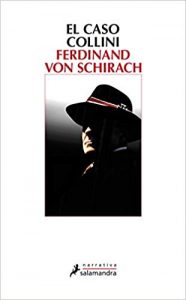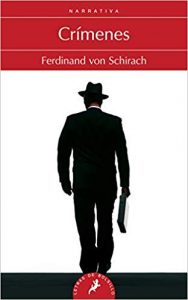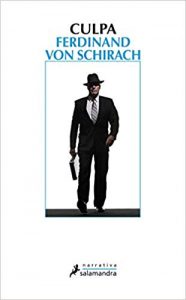If the case of John Grisham is an example of success in his literary extrapolation from the legal profession, to offer us great judicial thrillers, the already considerable bibliography of Ferdinand von Schirach.
Because this German lawyer makes his performance in the courtrooms an argument for novels, stories or even plays where plots are developed with that disturbing feeling that fiction is constantly surpassed by the reality brought by the author.
In a way, it makes perfect sense that someone like Schirach, dedicated from his office to the defense of various cases, ends up pouring creativity into his literature. Because in defensive cases, aspects as loaded with interpretation as reasonable doubt should be used or raised (in dubio pro reo), or the consideration of any mitigating factor.
There is no doubt that all defendants will be accused to a greater or lesser extent depending on their lawyer. And von Schirach's characters open our minds to all those nooks and crannies in which reality is loaded with the subjective elements necessary to erase guilt that could not be completely eliminated when they were only traces splattered with blood ...
Top 3 Recommended Books by Ferdinand Von Schirach
The Collini case
With my greatest fondness for the novel, it is natural that I select this, the best of his long works, quite a distance from the following: Taboo, as the best work of this author.
Undoubtedly when this book was published, with the relevance as a public figure of the author, I would already imagine that the scenarios presented, full of verisimilitude, would ignite the criticism of all kinds of jurists. Because the epic review (as it is said now), splashed justice mechanisms and those gaps that always appear in any democratic state as deficiencies inherent to this imperfect world (no less shameful).
But it is that beyond the media impact of the novel, the plot is presented as an intense fiction in which the lawyer Caspar Leinen lives with the particular sword of Damocles that begins to hang over him as soon as the matter comes to him in turn. job. Because his bond with the victim, as distant as it is intense in his most personal sphere, is hardly balanced with his professional duty. Fabrizio Collini killed his victim with that strange violence of a guy who just retired to face a carefree stretch of life. From that moment his motives for the crime are locked in his mind, without Caspar being able to recover anything.
In the heat of a case that takes him like a banshee due to its various implications, Caspar looks for the second way out, like the fox in the henhouse. And it finally exists. But its small space may end up taking away shreds of its skin because half of Germany will want to skin it alive.
Crimes
Presumably, this volume of stories would be born in those moments of vacation of the lawyer who has just finished his defense brief in front of the computer in his office. He has a few free minutes left and he prepares to leave his impressions, memories and scenarios of so many cases that he already accumulates behind his back black on white.
But it turns out that the sum of so many characters, the way in which he recounts his adventures make up a whole about aspects of crime that overflow humanity. Because there is a lot of human in the homicide, in the defeat capable of making you turn towards the shadows of the world. And the reality of repentance or complete psychopathy is also presented to us, always in parallel to the other reality of punishment or reintegration, with the part of each concept that finally harbors a sentence. Because each blow from the judge ends up being the bill to pay for what each one, engulfed in his own demons, ends up doing.
Guilt
It turned out that the Ferdinand Von Schirach effect, scourge of Justice in its literary aspect especially in a Germany in which every neighbor's child read something of his, had more to tell, with the same point of conciseness and frankness, as exposing the new judge who is your reader, the ins and outs of each case.
Only on these occasions impregnated with real cases, the lawyer stops circumlocution and allegations in search of acquittals and surrenders to the committed cause of literature, where there can be no falsehood that disenchants the reader. Fifteen new mosaic stories of real cases. Confessions of the crudeness of the defense attorney's profession, a faithful believer that without evidence there can be no incrimination, despite the black certainty of the client's guilt.
In each minimally improper acquittal or imprisonment under the slightest suspicion of error, resides a sense that society is exposed to plausible arguments rather than the truth itself.



